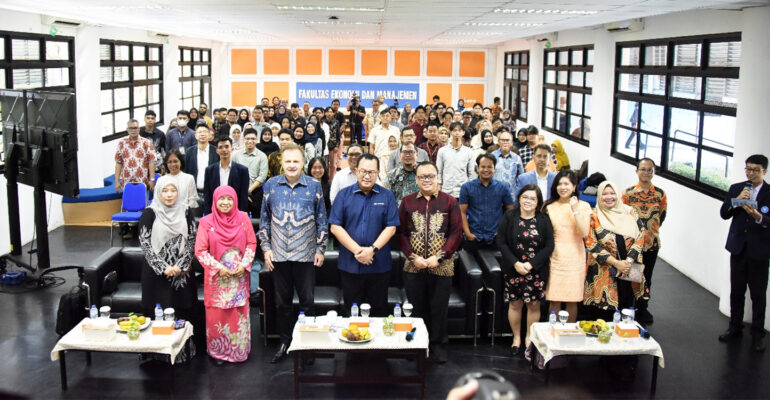IPB University Hosts Symposium for Sustainable Food System, Collaboration of 10 Universities from 8 ASEAN Countries

The Faculty of Economics and Management (FEM) of IPB University in collaboration with eight universities in Southeast Asia (ASEAN) organized “The 2nd ASEAN University Symposium for Sustainable Food System”.
This year’s symposium is a continuation of the meeting last April 2024, when IPB University together with 10 universities from 8 ASEAN countries formed the ASEAN University Network for Sustainable Food Systems.
The participating university delegates came from Universiti Putra Malaysia (UPM), University of the Philippines, Los Banos (UPLB)-Philippines, Chiang Mai University-Thailand, Kasetsart University-Thailand, National University of Laos, Royal University of Phnom Penh-Cambodia, Universiti Islam Sultan Sharif Ali-Brunei Darussalam, Yezin Agricultural University (YAU)-Myanmar and IPB University.
Dean of FEM IPB University, Dr Irfan Syauqi Beik said that he was honored to be the host this year. The same thing was also conveyed by the Rector of IPB University, Prof Arif Satria when giving an opening speech.
“Food security is no longer just a national issue, but has become a common concern at the regional and global levels. The challenges faced today are very diverse such as climate change, land degradation, and inefficient consumption patterns that disrupt food production and supply chains,” he said.
In the ASEAN region, continued Prof Arif, post-harvest food loss can reach 40 percent, equivalent to more than 1.8 million hectares of agricultural land wasted annually.
“These figures illustrate the urgent need to transform towards a more sustainable, resilient and inclusive food system. Therefore, universities must take an active role in shaping the future of the food system,” he said.
Meanwhile, Deputy for Coordination of Social Welfare Improvement, Coordinating Ministry for Human Development and Culture, Prof Nunung Nuryartono highlighted the need to build a sustainable food system, reduce poverty, and ensure food security.
“Digital agriculture, precision agriculture, agro-industry development in increasing productivity and food security, women’s participation and youth entrepreneurship need to be emphasized in our food system,” he said.
Also present was Datuk Amer Bukvić, Director and Resident Representative of the Islamic Development Bank (IsDB) Regional Hub Indonesia. He reviewed opportunities for cooperation with universities in training, research, knowledge transfer and funding of agricultural projects. (*/Rz) (IAAS/PRP)



